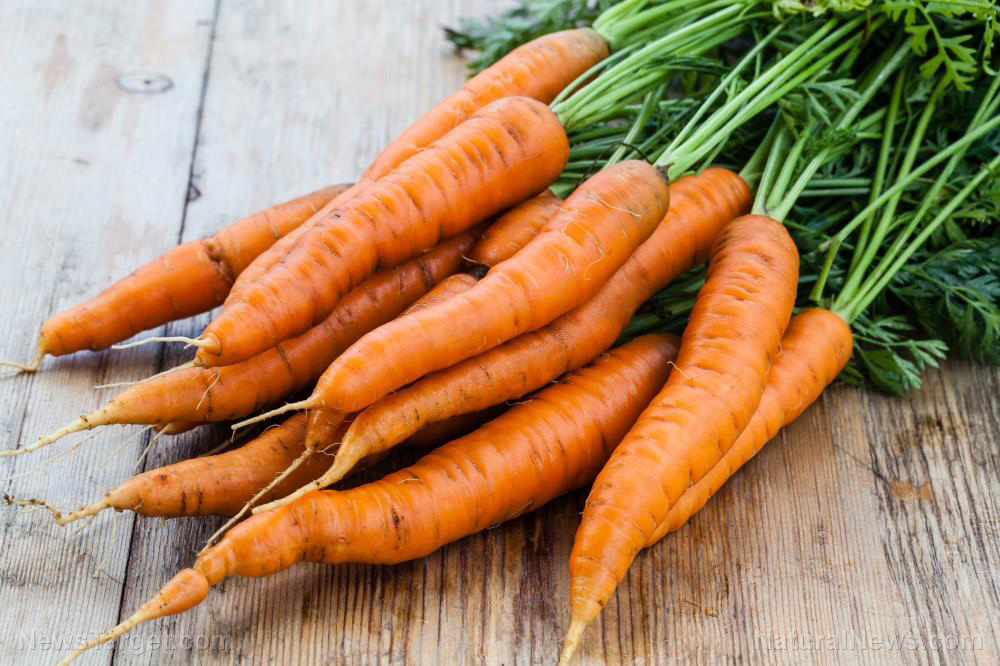Eating for your eyes: Carrots deliver nutrients that preserve vision
07/18/2019 / By Zoey Sky

Carrots are considered as superfoods for a reason: They’re delicious, full of nutrients, and rich in vitamin A. But can eating carrots really help improve eye health?
The amazing nutrient profile of carrots
Carrots are versatile root vegetables that can be consumed raw, cooked, or juiced. They can also be used to make various dishes like salads, soups, or stews. Carrots contain carotenoids — powerful antioxidants that also give them their unique orange color. Because they’re full of antioxidants and vitamin A, carrots can help improve eyesight.
Experts recommend eating carrots because they contain beta-carotene, which the body turns into vitamin A. Several studies have proven that vitamin A deficiency is linked to eye conditions like cataracts, macular degeneration, and xerophthalmia.
Carrots also contain vitamins C and E and antioxidants called lutein and zeaxanthin that are all essential for eye health. (Related: Sweet and versatile, carrots offer an impressive array of vitamins and minerals.)
Other vitamins and minerals that can be found in crunchy carrots are:
- Calcium
- Folate
- Manganese
- Niacin
- Potassium
- Riboflavin
- Thiamine
- Vitamin A
- Vitamin B6
- Vitamin C
- Vitamin K
Carrots are a good source of omega-3 and omega-6 fatty acids. Pectin, the main form of water-soluble fiber found in carrots, can help reduce blood sugar levels by slowing down the digestion of starch and sugar in the body. Since carrots have a low glycemic index (GI), they are good for diabetics.
The insoluble fibers in carrots, which mostly come in the form of cellulose, hemicellulose, and lignin, help promote healthy bowel movements. Additionally, nutrient-rich carrots help lower cholesterol levels.

Since carrots are low in calories, they can make you feel full easily. Snack on carrot sticks or make some salad with the root vegetable to lose weight.
The 6 main phytonutrients in carrots
Carrots contain plant compounds called phytonutrients. Below are six of the main phytonutrients found in carrots.
- Alpha-carotene – Alpha-carotene is partially converted into vitamin A. It can help protect the body from cellular damage.
- Anthocyanins – Anthocyanins possess antibacterial, anti-inflammatory, and antiviral properties. They help boost immunity and prevent infections.
- Beta-carotene – Beta-carotene is turned into retinoids inside the body. This phytonutrient is crucial for strengthening the immune system and improving eye and skin health. Beta-carotene also helps fight free radical damage that may cause different chronic diseases like cancer and cardiovascular conditions.
- Lutein – Lutein is an antioxidant often found in yellow and orange carrots. It is essential for maintaining eye health.
- Lycopene – Red fruits and vegetables, such as red and purple carrots and tomatoes, contain lycopene. This phytonutrient helps prevent heart diseases and lowers the risk of cancer.
- Polyacetylenes – Polyacetylenes are bioactive compounds in carrots that can help fight leukemia and other cancer cells.
As with all kinds of foods, carrots should be eaten in moderation to prevent side effects. Carotenemia can result from the excessive consumption of foods that contain beta-carotene. While the condition is harmless, it can give the skin a strange yellow-orange color.
Eating too many carrots can also cause constipation. Carrots contain insoluble fiber, and having too much of this fiber can bind the water in the intestinal tract and cause constipation.
Add carrots to your diet to boost your eye health and keep your immune system strong. Eating a healthy snack like carrot sticks can also help you lose weight naturally.
Sources include:
Submit a correction >>
Tagged Under:
#nutrition, antioxidants, beta carotene, carotenemia, carotenoids, carrots, clean food, dietary fiber, eye health, food is medicine, functional food, heart health, immune system, lutein, lycopene, natural health, organics, pectin, phytonutrients, prevention, research, vision, vitamin A, vitamin C, vitamin E, weight loss, zeaxanthin
This article may contain statements that reflect the opinion of the author





















